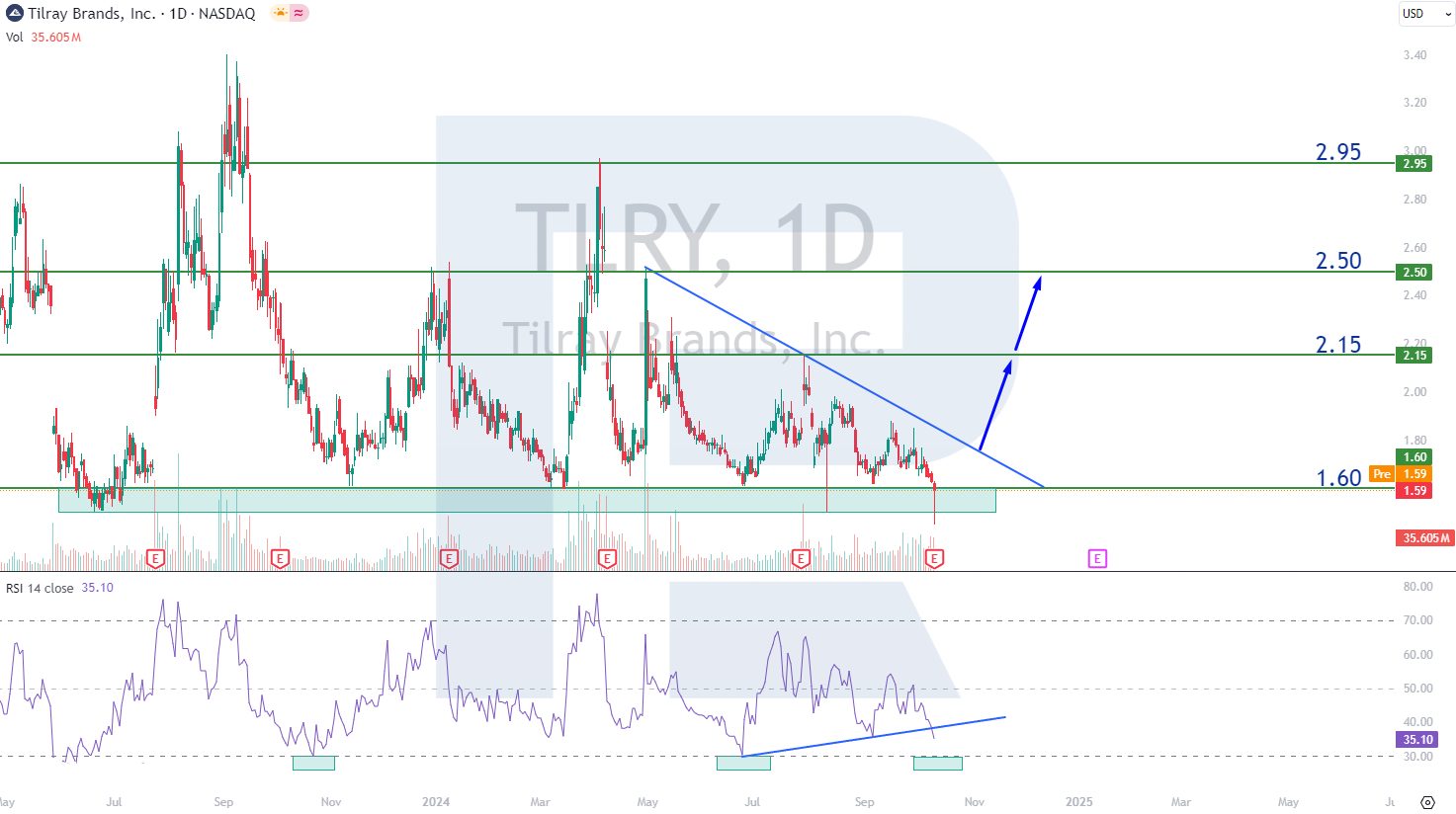Tilray Brands stock: what factors could drive its growth?
The release of the quarterly earnings report negatively impacted Tilray Brands Inc. (NYSE: TLRY) shares, with the price breaching the support level that has held since July 2023. The company’s revenue growth fails to attract investors; market participants are focused on the legalisation of cannabis and are ready to invest in the company only if this occurs. Although the US presidential nominees advocate for legalising marijuana, investors either do not believe them or expect more substantial actions in this direction.
This article introduces Tilray and its business and provides a fundamental and technical analysis of TLRY stock. Based on this analysis, a forecast for the stock price for the end of 2024 has been prepared.
About Tilray Brands Inc.
Tilray Brands Inc., founded in 2013, is a global leader in the cannabis industry. The company is involved in the cultivation, production, and distribution of cannabis and the production of hemp products. Tilray, headquartered in Leamington, Canada, went public on the NASDAQ under the TLRY ticker symbol on 19 July 2018.
In May 2021, Tilray completed the most significant acquisition in its history by purchasing rival company Aphria Inc. This resulted in forming the most prominent global company in the cannabis industry, with a market capitalisation of about 8.2 billion USD. The merged company retained the Tilray name and significantly strengthened its position in the medical recreational cannabis industry.
In 2023, Tilray bought another competitor, Hexo Corp. This deal markedly strengthened its position and confirmed its strategy of consolidating the hemp product market by acquiring competitors.
Cannabis legalisation in North America and Europe
The reason for Tilray’s IPO in 2018 was the emerging trend of cannabis legislation in Western countries. In October 2018, just three months after Tilray’s IPO, Canada became the first major nation to approve the recreational use of cannabis at the federal level. The Cannabis Act in Canada regulates the production, sale, and consumption of hemp products, allowing adults to purchase and possess up to 30 grams of dried product.
The US followed suit. At the federal level, cannabis is still classified as a prohibited substance. However, since 2018, various states have legalised its recreational use, with 24 states officially permitting it by 2024. Simultaneously, reforms at the federal level are under discussion, including a bill known as the MORE Act (an attempt to decriminalise cannabis) and proposals for banking services for companies dealing with hemp products. However, as of October 2024, critical decisions on these issues have yet to be made.
European countries are taking a cautious approach to the legalisation of recreational cannabis use. By 2024, only Germany, Luxembourg, and Malta have legalised marijuana in Europe, but solely for personal use.
The medical application of cannabis has gained broader worldwide support. In the US, 37 states have permitted its use in medical procedures, while in Europe, it is approved in Germany, Denmark, the Netherlands, Poland, and Portugal. Australia, Brazil, and New Zealand have also authorised hemp products for medicinal purposes. Many Western countries are leaning towards a more liberal approach to cannabis but have yet to commit to full-scale legalisation.
Investor interest in Tilray Brands Inc.’s shares
Tilray was one of the first cannabis companies to enter the US stock market via an IPO on the NASDAQ exchange in 2018. This gave it an edge over its competitors by granting access to large US investors and the broader capital market, as evidenced by its stock price surging by over 1,300% in just two months.
As Tilray’s target market was still in its early stages, its financial performance did not support the rapid rise in market capitalisation, and it remains unprofitable. The investor frenzy was fuelled purely by rumours of cannabis legislation in the US, its primary sales market. As a result, prices gradually declined, and by March 2020, the company’s shares had lost 99% of their value.
Interest in marijuana was revived by Joseph Biden Jr.’s presidential campaign, during which he proposed decriminalising cannabis use at the federal level. He also advocated for clearing marijuana-related criminal records and legalising medical cannabis nationwide. By 20 November, the stock price had risen by 400%, and after Biden was elected president, the shares continued to climb, gaining 2,670% from the 26 March low by 12 February 2021. This was followed by a lengthy period of legislative deliberations regarding cannabis legislation in the US and around the world, during which Tilray’s stock gradually declined.
The excitement around cannabis left many investors ‘locked’ in Tilray shares, as their value had dropped by 97% from the 12 February peak. They now have to wait for news of regulatory easing in the sector. Another presidential race may reignite interest in cannabis stocks, but until then, investors can examine financials and anticipate federal-level legalisation.
US presidential candidates and the legalisation of cannabis
Kamala Harris and Donald Trump have different approaches to the issue of cannabis legalisation in the 2024 presidential race. Harris is an advocate for the full federal legalisation of cannabis. She actively supports decriminalisation and champions social reforms aimed at addressing racial inequalities related to drug offences. She was also one of the authors of the MORE Act, a bill aimed at decriminalising cannabis and restoring rights to those convicted of non-violent crimes related to it.
Trump openly supports cannabis legalisation; however, only at the state level. He emphasises that each state should have the right to decide whether to legalise cannabis or not independently. Furthermore, he has advocated for reclassifying marijuana from Schedule I (the strictest category) to Schedule III. This change would facilitate scientific research and reduce the tax burden for companies in the industry. Trump’s approach opens the door for deeper exploration of the medical properties of cannabis and improving conditions for businesses in the sector.
Tilray Brands Inc.’s business model
The long process of legalising cannabis at the federal level in the US prompted Tilray to find other ways of using products to increase revenue. In 2024, revenue was derived from the following sources:
- Cannabis business: this is the company’s main segment, which includes selling recreational and medical hemp products. Tilray continues to build its position in this sector in the markets where marijuana is already legalised
- Alcoholic beverages: Tilray is actively developing this business by purchasing companies such as SweetWater Brewing and Breckenridge Distillery, offering craft beer and other alcoholic products
- Distribution business: this includes the production and sale of cannabis and other products, enabling the company to expand its client base and generate additional earnings
- Wellness Business: this includes launching health-promoting products with cannabinoid-based ingredients such as CBD. Tilray offers various products to improve consumers’ physical and mental health, including supplements and stress-relief solutions
Tilray Brands Inc.’s Q1 2025 report
On 10 October, Tilray released its report for Q1 fiscal 2025, ending on 31 August. Below are the key financial indicators:
- Revenue: 200.0 million USD (+13%)
- Net loss: 34.7 million USD (compared to 55.9 million USD a year ago)
- Earnings per share: 0.04 USD (compared to 0.10 USD a year ago)
- Gross profit: 59.7 million USD (+35%)
Revenue by segment:
- Beverage alcohol business: 56.0 million USD (+132%)
- Cannabis business: 61.2 million USD (-13%)
- Distribution business: 68.1 million USD (-2%)
- Wellness business: 14.8 million USD (+11%)
Fundamental analysis of Tilray’s report shows no growth in the cannabis and distribution segments, meaning the company requires full legalisation of cannabis both in the US and internationally. The alcohol business has demonstrated significant growth, indicating that the merger with producers of alcoholic beverages was a fruitful move. The segment currently generates about 30% of total revenue.
According to the company’s quarterly report commentary, Tilray’s Chair and CEO Irwin Simon expects the upcoming US election to result in improved regulatory changes in the cannabis industry as both candidates have publicly expressed their support for further cannabis legalisation.
Technical analysis of Tilray Brands Inc.’s stock
Following the release of the quarterly report, the stock price breached the support at 1.60 USD, a key level it had held since July 2023. A breakout below this level reinforces the negative trend. However, not all is lost. Below 1.60 USD lies the support level of 1.50 USD, from which the stock price has rebounded twice, resulting in a 126% surge on the first occasion and a 30% increase on the second. The potential for a rise persists, provided the price does not drop below this support level. Based on Tilray stock performance, two forecasts for Tilray stock can be considered.
The optimistic forecast for Tilray stock for the end of 2024 suggests a breakout of the descending trend line, with the price rising to the nearest resistance level at 2.15 USD. A breakout above this level may drive the price up to 2.50 USD. This scenario is possible due to US presidential candidates’ focus on the cannabis market and their statements in favour of legalising marijuana at the federal level.
The pessimistic forecast for Tilray stock for the 2024 year-end may occur if the stock price breaks below the 1.50 USD support level, which could send it further down. The price could reach a new all-time low when the Relative Strength Index (RSI) falls to 30.
Analysis and forecast for Tilray stock for 2024Summary
Although Tilray has strengthened its position in the cannabis market by acquiring competitors, this is insufficient for investors. Tilray must become profitable and demonstrate to investors that it has a promising market that can significantly increase revenues. The alcoholic beverage market can fulfil this role, as it generates about 30% of Tilray’s total revenues and shows triple-digit growth. However, investors are still ignoring this.
As of October 2024, the legalisation of cannabis at the federal level in the US remains the primary driver of stock growth. The presidential candidates will likely use this issue in their election campaigns. However, as history from previous elections shows, things have not progressed beyond promises in this direction.
The current election race may increase the stock’s volatility. Given Tilray’s low share price, short-term returns may exceed 100%, making it suitable for speculative trading. However, the viability of long-term investments in the company’s shares remains highly questionable.



